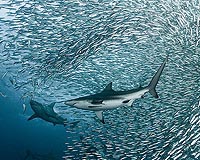 |
Brussels (AFP) March 10, 2010 The king of Japanese sushi and sashimi may disappear from menus after Europe joined the United States on Wednesday in arguing for a ban on trade in Atlantic bluefin tuna. The 27 European Union nations agreed, despite opposition from Mediterranean island Malta, to urge a United Nations body that lists endangered species to vote for a ban when it meets in Qatar, starting on Saturday. A diplomatic source said the big Mediterranean states responsible for half of the world's catch, France, Spain and Italy, all backed the decision in an anticipated move that has already angered Japan, far and away the largest consumer of the fish. Europe's position is slightly complicated, in that international trade in the fish would not be banned before next year, in May at the latest, and smaller-scale "artisanal" fishing, not for export beyond the world's biggest trading bloc, would still be permitted. Brussels wants scientific evidence from the International Commission for the Conservation of Atlantic Tunas, which groups fishing states and has already decided to slash 2010's permissible global catch, to be taken into account first. It has also yet to "study" means through which to compensate industrial-scale super-trawler crews whose livelihoods will be lost, although existing EU aid is already being claimed by Italy after a voluntary moratorium was imposed there. A diplomatic source said the difficulty there lay in the scale of the sums required by way of compensation -- way above that set aside in normal European Commission fisheries support funding. He also warned that a row was brewing over which countries would finance the aid to tied-up boat crews -- with the Mediterranean big three expected to pay for their own, but EU rules requiring all 27 to be involved. Finding a compromise, such as other countries chipping in, but somehow being reimbursed via funding for non-fish-related projects, was already proving troublesome, he warned. Marine wildlife experts say that, despite fishing quotas, bluefin tuna stocks have collapsed in recent decades in its prime hunting grounds of the western Atlantic and Mediterranean. Environmental activists Greenpeace and the World Wildlife Federation have been calling for months for a ban to be introduced. If approved by the Convention on International Trade in Endangered Species, the question then will be whether Japan -- whose fish markets shells out most of the billions of euros or dollars increasingly required to buy the prized species each year -- defies restrictions. Tokyo's deputy fisheries minister Masahiko Yamada last week said it would ignore any ban, warning "Japan will inevitably have to take a reservation" if the body votes for a halt to trading. Member countries which take a "reservation" would effectively be able to keep trading with other nations that also opt out of the ban. In November, Japan said it supported ICCAT's 40 percent 2010 quota cut, from 22,000 tonnes in 2009 to 13,500 tonnes this year. Environmentalists say industrial fleets routinely exceed such limits. Other countries believed to oppose a ban include Canada and China. A ban on the tuna trade would require support by two-thirds of the roughly 175 nations that make up CITES.
Share This Article With Planet Earth
Related Links Farming Today - Suppliers and Technology
 Overfishing prompts Brazil sardine curbs
Overfishing prompts Brazil sardine curbsRio De Janeiro (UPI) Mar 9, 2009 Overfishing is threatening to decimate Brazil's seafood resource and the latest danger concerns the country's sardine catch, which has led officials to speed up plans for conservation of the species. Sardine is part of the staple diet in Brazil's coastal areas and most of last year's catch of 100,000 tons was unloaded in the states of Rio do Janeiro, Santa Catarina and Sao Paulo, Merco ... read more |
|
| The content herein, unless otherwise known to be public domain, are Copyright 1995-2010 - SpaceDaily. AFP and UPI Wire Stories are copyright Agence France-Presse and United Press International. ESA Portal Reports are copyright European Space Agency. All NASA sourced material is public domain. Additional copyrights may apply in whole or part to other bona fide parties. Advertising does not imply endorsement,agreement or approval of any opinions, statements or information provided by SpaceDaily on any Web page published or hosted by SpaceDaily. Privacy Statement |